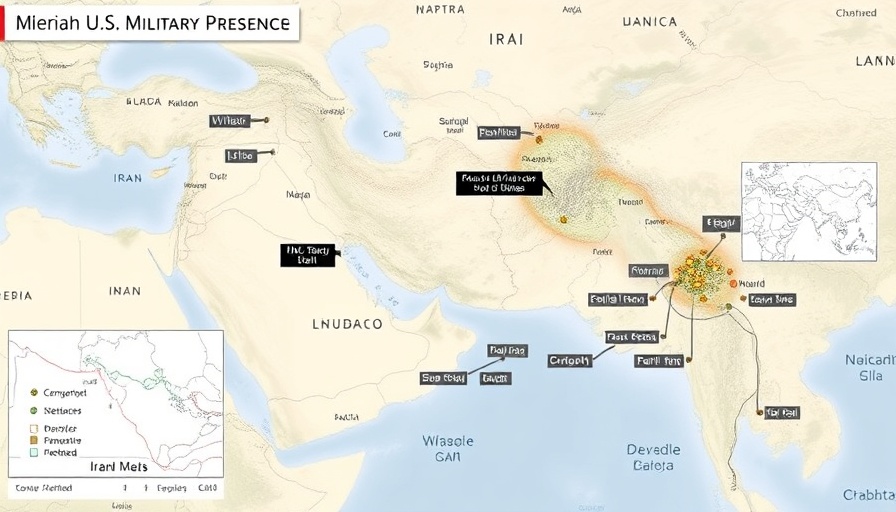
Could a New Conflict Place U.S. Troops in Danger?
The potential involvement of American troops in the ongoing Israel-Iran conflict raises serious questions about their safety. With President Trump contemplating military action against Iran to curb its nuclear ambitions, thousands of U.S. personnel stationed in the Middle East could find themselves increasingly at risk. The area already hosts approximately 40,000 troops spread across critical bases in Kuwait, Iraq, and elsewhere, leading some military experts to warn that escalating tensions could place these forces directly in Iran's crosshairs.
The Consequences of Escalation in the Region
If military action were to commence, officials caution that U.S. troops would only have minutes to react should Iranian strikes become imminent. Iran's leadership has made it clear through various statements that it intends to retaliate against U.S. involvement, suggesting that deploying additional forces could provoke swift retaliation. In a single, focused military operation, the ramifications could extend beyond traditional combat scenarios to lethally target U.S. bases.
Understanding the Current Military Landscape
The U.S. maintains a significant military presence in the Middle East, with installations like Al Udeid Air Base in Qatar and Al Asad Air Base in Iraq being critical components of U.S. operations. These bases not only serve as logistical hubs but also harbor defensive capabilities. However, should the region experience heightened hostility, the very bases designed to protect U.S. interests may become vulnerable targets.
The Historical Context: U.S. Relations with Iran
The relationship between the United States and Iran has been fraught with tension since the Islamic Revolution of 1979. Previous military encounters, diplomatic sanctions, and acts of aggression have shaped the current dynamics. The ongoing nuclear dispute remains central; a military strike by the U.S. could not only escalate hostilities but also lead to broader regional destabilization.
What Happens Next? Future Outlooks and Predictions
Military analysts predict that any direct confrontation with Iran might not be a short-lived affair. Instead, it could lead to a drawn-out conflict, with the potential to entangle other nations and widen the battlefield. The risks of miscalculation or accidental escalations increase significantly in such volatile conditions. Moreover, Iran’s capability to leverage proxy groups across the region could complicate U.S. military responses and strategies.
Exploring Diverse Perspectives on This Conflict
While many military and political analysts argue the necessity of a strong U.S. stance against Iranian aggression, others warn against military escalation. Peace advocates push for renewed diplomatic efforts to resolve tensions without resorting to lethal force. Engaging allies and employing negotiation tactics could provide avenues for de-escalation that do not involve direct military action.
Why Understanding This Issue Matters
The implications of potential U.S. military action against Iran extend beyond the battlefield. Understanding the geopolitical landscape is crucial not only for military personnel and policymakers but also for citizens who could be affected by the consequences of military decisions. Awareness fosters informed public dialogue and can lead to collective advocacy for monitoring U.S. foreign policy decisions.
Take Charge! What You Can Do
As a concerned citizen, staying informed about developments in U.S.-Iran relations empowers you to engage in conversations, advocate for peace, and hold leaders accountable for their foreign policy decisions. Follow reputable news sources, participate in community discussions, and voice your opinions to ensure a more peaceful future.
In light of mounting tensions in the Middle East, it is essential for all of us to be aware of the risks involved, particularly regarding the safety of our troops abroad. By understanding these complex issues, we can better advocate for solutions that prioritize peace and security.
 Add Row
Add Row  Add
Add 




 Add Row
Add Row  Add
Add 

Write A Comment